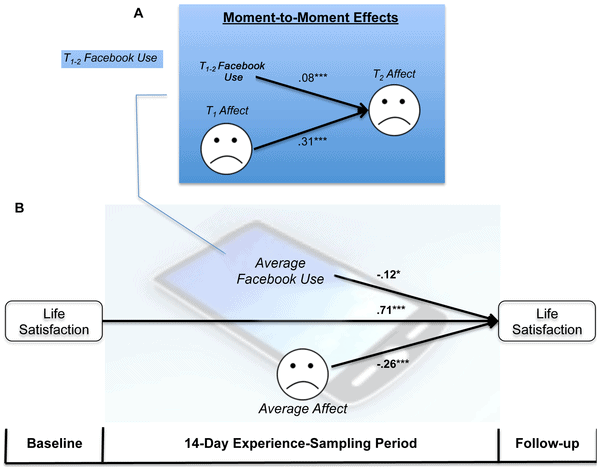

A new study says Facebook is making young people depressed.
The authors of the study, entitled “Facebook Use Predicts Declines in Subjective Well-Being in Young Adults” say they texted research subjects five times a day for two weeks and found that the more people used Facebook the worse they felt.
“On the surface,” it says, “Facebook provides an invaluable resource for fulfilling the basic human need for social connection. Rather than enhancing well-being, however, these findings suggest that Facebook may undermine it.”
The authors point out that more than a billion people use Facebook, more than half of them every day. But no research has ever been done to study the social network’s effect on persona well-being.
The study recruited 82 people by posting flyers around the University of Michigan, in Ann Arbor. The median age of the participants was 19.52, 53 were female, 29 male. 60.5% of them were European American, 28.4% Asian, 6.2% African American, and 4.9% other. Three participants dropped out along the way.
After signing up, study subjects were text-messaged five times per day between 10am and midnight over a two-week period. Each text message contained a link to an online survey that asked five questions; 1. How do you feel right now? 2. How worried are you right now? 3. How lonely do you feel right now? 4. How much have you used Facebook since the last time we asked? 5. How much have you interacted with other people “directly” since the last time we asked?
The study’s conclusion is that the use of Facebook use predicts declines in affect and life satisfaction over time. The authors looked at other explanations for this finding, including the idea that people might be using Facebook when they feel bad, but found the data didn’t support this critique, or the idea that people might feel bad any time they interact with other people.
“Critically, we found no evidence to support two plausible alternative interpretations of these results,” says the study. “First, interacting with other people “directly” did not predict declines in well-being. In fact, direct social network interactions led people to feel better over time. This suggests that Facebook use may constitute a unique form of social network interaction that predicts impoverished well-being. Second, multiple types of evidence indicated that it was not the case that Facebook use led to declines in well-being because people are more likely to use Facebook when they feel bad—neither affect nor worry predicted Facebook use and Facebook use continued to predict significant declines in well-being when controlling for loneliness (which did predict increases in Facebook use and reductions in emotional well-being).”
What do you think? Is Facebook bad for young people? Should they be engaging in more face to face interaction?
Leave a Reply
You must be logged in to post a comment.



 Share
Share Tweet
Tweet Share
Share




Comment